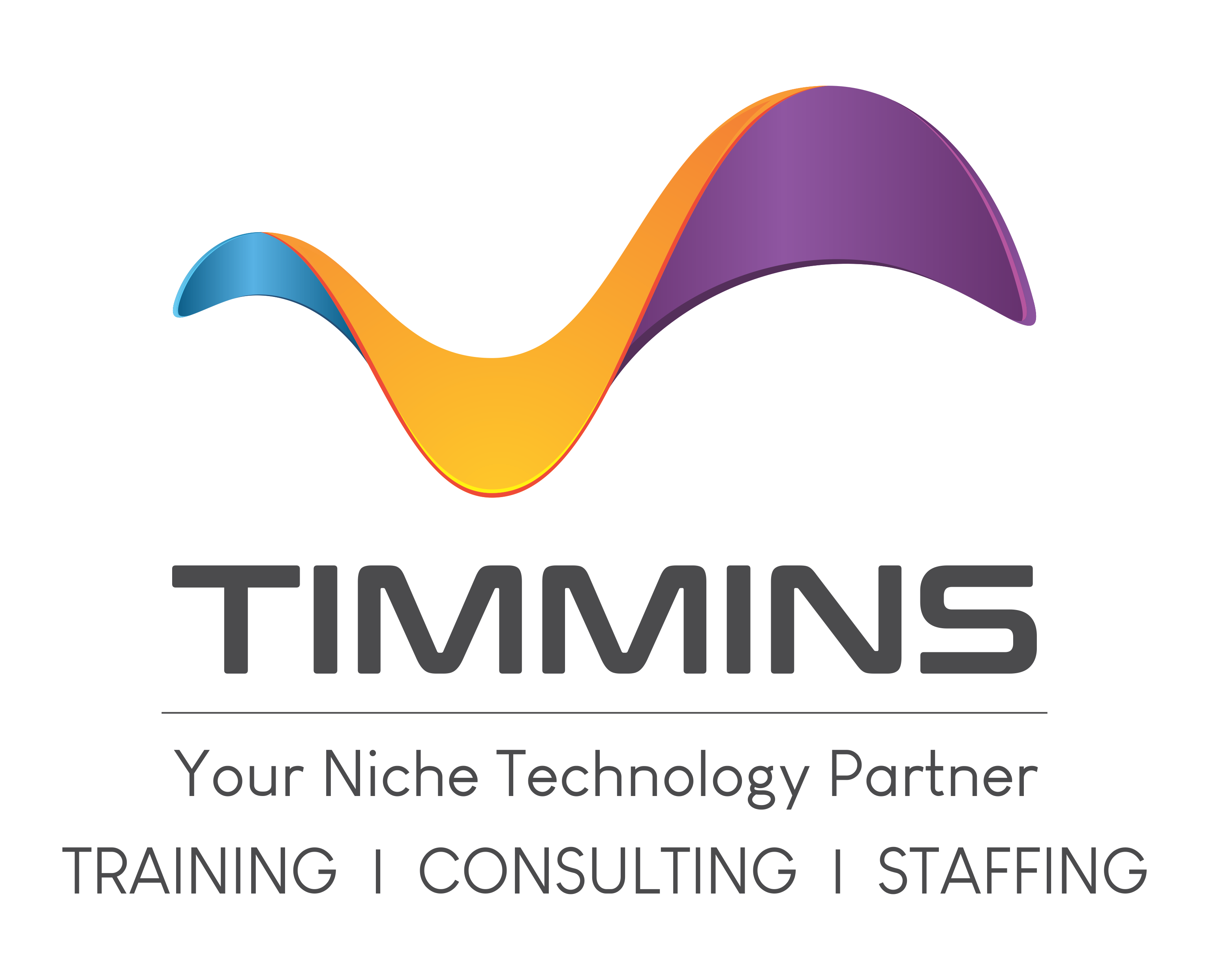
16 Courses

Artificial Intelligence, Machine Learning, Deep Learning
Machine Learning using Python
HRDC Reg. No: 10001553480
Duration: 5 Days (35 Hours)
Course Overview
This 5-day practical training offers a complete foundation in Machine Learning using Python, blending theory with real-world implementation. Participants will learn data preprocessing, visualization, supervised and unsupervised learning, ensemble methods, and deep learning with TensorFlow and Keras. Ideal for professionals aiming to build deployable ML models, the course concludes with a capstone project and emphasizes model tuning, explainability, and production readiness.
Who Should Attend
-
Data Analysts and Data Scientists
-
Python Developers transitioning into ML
-
AI/ML Engineers and Automation Developers
-
Technical Leads and Software Engineers in analytics
Why Choose This Course
This HRDC claimable course (Reg. No: 10001553480) equips participants with production-ready ML skills using Python, Scikit-learn, TensorFlow, and Keras. From data prep to model deployment, it focuses on performance, validation, and real-world use cases across industries like finance, healthcare, retail, and IoT.
Learning Outcomes
By the end of this course, participants will be able to:
-
Identify appropriate ML use cases across industries
-
Clean, preprocess, and visualize data using Pandas, Numpy, Matplotlib, and Seaborn
-
Build, evaluate, and tune regression and classification models
-
Apply clustering, PCA, and other unsupervised techniques
-
Conduct sentiment and topic modeling using NLP
-
Develop and train deep learning models with TensorFlow and Keras
-
Optimize and deploy ML models as web services
Teaching Methodology
-
Concept-first explanation with live coding
-
Daily hands-on labs using real-world datasets
-
Capstone project and optional assessments
-
Case studies across industries
-
Group discussions and code reviews

Artificial Intelligence, Machine Learning, Deep Learning
Machine Learning Fundamentals: Practical Application with Python
HRDC Reg. No: 10001544293
Duration: 14 Hours (2 Days)
Course Overview
This intensive course introduces participants to the fundamentals of machine learning using Python. It combines essential theory with extensive hands-on practice using real-world datasets. Key topics include supervised and unsupervised learning, data preprocessing, and model evaluation. Participants will complete a full machine learning project using Python, Jupyter Notebook, and Scikit-learn.
Who Should Attend
-
Software Engineers moving into data science roles
-
Data Analysts/Scientists seeking structured ML foundations
-
Researchers & Academics applying ML to their fields
-
Technical Professionals in automation, analytics, and prediction systems
-
STEM Graduates preparing for ML or AI careers
Why Choose This Course
HRDC Claimable (ID: 10001544293)
Delivered by industry practitioners with hands-on expertise. Participants gain job-ready ML skills applicable across industries including:
-
Banking & Financial Services: Credit scoring, fraud detection, churn analysis
-
Healthcare & Pharmaceuticals: Disease prediction, patient segmentation
-
Telecommunications: Customer behavior modeling, quality prediction
-
Retail & E-Commerce: Recommendation systems, pricing optimization
-
Manufacturing & IoT: Predictive maintenance, quality control
Learning Outcomes
Upon completion, participants will be able to:
-
Grasp core machine learning concepts and workflows
-
Prepare and preprocess data with industry-standard Python libraries
-
Apply regression, classification, and clustering algorithms
-
Evaluate models using metrics such as accuracy, precision, recall, and ROC-AUC
-
Build and document a full ML solution using real-world data
Prerequisites
-
Basic Python knowledge (data types, functions, loops)
-
Basic math & statistics understanding (mean, median, standard deviation, correlation)
-
No prior machine learning experience required
Lab Setup
-
Install Anaconda and Jupyter Notebook
-
Use Python libraries: Pandas, NumPy, Matplotlib, Seaborn, Scikit-learn
-
Access to datasets for hands-on projects
Teaching Methodology
-
Hands-On Coding: Live demos and guided coding using real datasets
-
Project-Based Learning: Complete an end-to-end ML project
-
Immediate Application: Concepts reinforced with practical Scikit-learn examples
-
Visual Diagnostics: Graphs, ROC curves, confusion matrices to enhance understanding
-
Instructor Feedback: Capstone project review and critique

Artificial Intelligence, Machine Learning, Deep Learning
Machine Learning using Scikit Learn
HRDC Registration Number: 10001547676
Course Duration: 35 Hours (5 Days)
Course Overview
This comprehensive course introduces machine learning, data science, and statistical modeling using Python and Scikit-learn. Participants will gain strong theoretical foundations and practical skills in data preprocessing, regression, classification, clustering, ensemble methods, text analytics, and neural networks. The training emphasizes real-world applications through extensive hands-on labs and case studies.
Who Should Attend
-
Data Analysts
-
Software Engineers
-
AI/ML Enthusiasts
-
Business Analysts
-
Recent Graduates in Technical Fields
Why Choose This Course
HRDC Claimable (upon registration). This hands-on course delivers a strong blend of theory (40%) and practice (60%) to build real-world machine learning solutions. Using Scikit-learn and TensorFlow, it prepares participants for production-ready ML projects and includes an optional capstone project.
Learning Outcomes
Participants will:
-
Understand supervised and unsupervised learning techniques
-
Implement ML models using Python and Scikit-learn
-
Perform data transformation and visualization
-
Apply text analytics using Spacy
-
Build and tune ensemble models (XGBoost, LightGBM)
-
Construct neural networks with TensorFlow and Keras
-
Deploy ML models as web services
Prerequisites
-
Python programming experience
-
Knowledge of basic linear algebra, statistics, and differential algebra
-
Pre-course reading (provided)
Lab Setup
Hardware Requirements:
-
CPU: Intel i5 (8-core), RAM: 8 GB minimum (16 GB preferred), HDD: 50 GB
-
OS: Ubuntu 22, Windows 10, or macOS
Software Requirements:
-
Anaconda (Python), Pycharm, TensorFlow 2.x, Scikit-learn, Seaborn, Spacy
-
Internet access for GitHub and data downloads
-
Admin access for software installation
Teaching Methodology
-
Interactive lectures
-
Hands-on lab exercises
-
Case studies with open datasets
-
Pre- and post-training assessments
-
Capstone project (optional)

Artificial Intelligence, Machine Learning, Deep Learning
NLP (Natural Language Processing) using Spacy
HRDC Reg. No: 10001548409
Course Duration: 28 Hours (4 Days)
Course Overview
This hands-on course introduces participants to Natural Language Processing (NLP) using Python libraries such as SpaCy, NLTK, Scikit-learn, and TensorFlow. The training covers both Natural Language Understanding (NLU) and Generation (NLG), with real-world applications including sentiment analysis, text classification, summarization, and conversational AI. Participants gain practical experience through guided labs and projects.
Who Should Attend
-
Data Scientists
-
Machine Learning Engineers
-
Software Developers
-
AI Enthusiasts
-
Researchers in Computational Linguistics
Why Choose This Course
HRDC Claimable. Learn to implement real-world NLP projects with modern Python tools. Participants will handle unstructured text, build text classification models, and develop conversational agents using RASA, making them skilled in practical language AI applications.
Learning Outcomes
Participants will be able to:
-
Apply core NLP techniques: tokenization, stemming, lemmatization, POS tagging, NER
-
Extract, clean, and classify text using SpaCy, NLTK, and Scikit-learn
-
Use BoW, TF-IDF, and Word2Vec for text modeling
-
Perform sentiment analysis on Twitter data
-
Generate summaries and implement conversational bots using RASA
Prerequisites
-
Basic Python programming skills
-
Familiarity with machine learning concepts (optional but helpful)
Lab Setup Requirements
Hardware:
-
Intel i5 CPU or higher
-
8 GB RAM or more
-
Admin rights to install software
Software:
-
Anaconda (Python 3.6+)
-
SpaCy, NLTK, Scikit-learn, TensorFlow, Keras
-
BeautifulSoup, Textract
Teaching Methodology
-
Instructor-led demos and hands-on labs
-
Real-world case studies and text sources
-
Guided project work with practical NLP use cases

Artificial Intelligence, Machine Learning, Deep Learning
Machine Learning using Apache Spark
HRDC Reg. No: 10001548586
Course Duration: 35 Hours (5 Days)
Course Overview
This hands-on course covers scalable machine learning using Apache Spark. Participants learn the theory and practice of key ML algorithms, including regression, classification, clustering, and text analytics. Real-world datasets and Spark MLlib are used throughout the course, with implementations in Python and supplementary demos in R and Scala.
Who Should Attend
-
Data Scientists
-
Machine Learning Engineers
-
Data Analysts
-
Data Engineers
-
Software Developers transitioning to AI/ML roles
Why Choose This Course
HRDC Claimable (upon registration). Designed for scale and practical relevance, this course teaches you how to design and deploy machine learning models using Spark. Ideal for building robust ML pipelines in distributed environments using real-world datasets.
Learning Outcomes
By the end of this course, participants will be able to:
-
Grasp ML fundamentals and Spark architecture
-
Build regression, classification, and clustering models
-
Analyze text data using NLP techniques
-
Use Spark MLlib and SparkR for scalable machine learning
-
Optimize models with tuning and feature engineering
-
Deploy ML models for real-time and batch applications
Prerequisites
-
Basic knowledge of statistics and programming (Python, R, or Scala)
-
Familiarity with data analysis and basic machine learning concepts
Lab Setup
Hardware Requirements:
-
Processor: Intel i5 or higher
-
RAM: Minimum 8 GB
-
Storage: 10 GB free space
Software Environment:
-
Python 3.8+ (via Anaconda)
-
R and RStudio
-
Apache Spark 3.x (local or cluster mode)
-
Libraries: PySpark, Scikit-learn, Pandas, Numpy, Matplotlib, SparkR, GraphX, NLTK, SpaCy
-
IDEs: JupyterLab/Notebook, IntelliJ, Zeppelin (optional)
-
Git, Docker (optional), internet access
Teaching Methodology
-
Theoretical concepts with real-world case studies
-
Hands-on lab exercises using open datasets
-
Capstone project (optional for advanced learners)

Artificial Intelligence, Machine Learning, Deep Learning
Deep Learning - TensorFlow, Keras
HRDC Reg. No: 10001547631
Course Duration: 35 Hours (5 Days)
Course Overview
This course offers an end-to-end learning experience in machine learning and deep learning using Python. Combining theoretical principles with extensive hands-on labs, it equips participants with the skills to build, evaluate, and deploy models using tools like TensorFlow, Keras, and Scikit-learn. Core topics include supervised learning, unsupervised learning, ensemble techniques, reinforcement learning, and NLP.
Who Should Attend
-
Data Scientists and ML Engineers
-
Software Developers
-
Technical Researchers
-
Business and Data Analysts
-
Professionals entering AI/ML fields
Why Choose This Course
HRDC Claimable. Participants will gain real-world ML skills by working with open data, applying deep learning using TensorFlow/Keras, and understanding model deployment. The course culminates with a capstone project to consolidate learning through practical applications.
Learning Outcomes
Participants will:
-
Perform data wrangling and visualization with Pandas, NumPy, and Matplotlib
-
Apply regression and classification algorithms with Scikit-learn
-
Build and evaluate deep neural networks using TensorFlow and Keras
-
Implement ensemble learning and clustering
-
Perform text mining and sentiment analysis
-
Explore reinforcement learning using OpenAI Gym
-
Understand ML deployment and optimization techniques
Prerequisites
-
Proficiency in Python
-
Basic linear algebra, differential algebra, and statistics
-
Familiarity with ETL and basic machine learning concepts
Lab Setup Requirements
Hardware:
-
Intel i5 processor or higher
-
8 GB RAM (minimum)
-
10 GB disk space
-
Admin rights for software installations
Operating Systems:
-
Windows 10/11, macOS Monterey+, or Ubuntu 20.04+
Software:
-
Anaconda (Python 3.8/3.9)
-
JupyterLab/Notebook
-
Python libraries: NumPy, Pandas, Matplotlib, Seaborn, Scikit-learn, TensorFlow 2.x, Keras, NLTK, SpaCy, OpenAI Gym
Teaching Methodology
-
Instructor-led lectures and real-world case studies
-
Hands-on coding labs
-
Use-case driven problem solving
-
Optional capstone project
-
Pre and post assessments (optional)
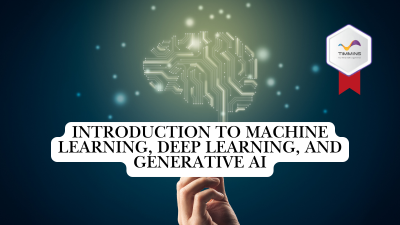
Artificial Intelligence, Machine Learning, Deep Learning
Introduction to Machine Learning, Deep Learning, and Generative AI
HRDC Reg. Number: 10001462238
Duration: 14 Hours
Course Overview
This training provides a comprehensive introduction to the concepts and applications of Machine Learning, Deep Learning, and Generative AI. Participants will gain both theoretical knowledge and hands-on experience through practical exercises, enabling them to effectively apply these technologies in real-world scenarios.
Who Should Attend
Professionals across the following industries and roles are encouraged to attend:
Industries:
- Technology
- Healthcare
- Finance
- Retail
- Education
Participants:
- Data Scientists
- Machine Learning Engineers
- AI Researchers
- Software Developers
- IT Professionals
Why Choose This Course
This HRDC-claimable course (Reg. No: 10001462238) equips participants with the skills to harness cutting-edge AI technologies, offering hands-on training with tools like TensorFlow, Keras, and OpenAI’s APIs.
Learning Outcomes
Participants will:
- Understand key concepts and applications of Machine Learning, Deep Learning, and Generative AI.
- Create and interpret machine learning models for regression and classification tasks.
- Build and train neural networks using TensorFlow and Keras.
- Gain practical knowledge of Generative AI and its applications, including ChatGPT.
- Develop skills in effective prompting and chatbot creation using OpenAI tools.
Prerequisites
- Basic knowledge of Python programming.
Lab Setup
- Computers with Python, TensorFlow, and Keras installed.
- Access to OpenAI API.
- Sample datasets for regression and classification tasks.
- Development environment for chatbot creation.
Teaching Methodology
- Lectures and theoretical discussions.
- Hands-on practical exercises and labs.
- Real-world case studies.
- Interactive Q&A sessions.
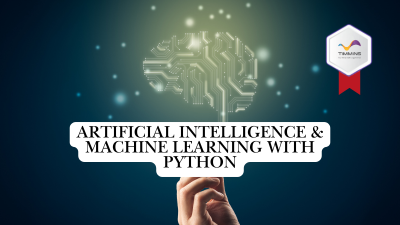
Artificial Intelligence, Machine Learning, Deep Learning
Artificial Intelligence & Machine Learning with Python
HRDC Reg. No: 10001463637
Duration: 35 hours (5 days)
Course Overview
This course offers a comprehensive introduction to Artificial Intelligence (AI) and Machine Learning (ML) using Python. Participants will explore essential concepts, implement algorithms, and analyze data using Python libraries. The program emphasizes hands-on learning with real-world applications, enabling participants to develop and deploy AI and ML models effectively.
Who Should Attend
-
Target Audience:
- Aspiring data scientists and AI/ML enthusiasts
- Software engineers and developers
- Professionals transitioning to AI/ML roles
- Students and graduates in computer science, engineering, or related fields
-
Target Industries:
IT, healthcare, finance, retail, manufacturing, automotive, and other industries leveraging AI and ML
Why Choose This Course?
- HRDC Claimable (HRDC Registration No: 10001463637).
- Hands-on training with real-world AI/ML applications.
- Covers supervised & unsupervised learning, deep learning, and model deployment.
- Learn industry-standard AI tools & frameworks (Scikit-Learn, TensorFlow, Keras).
Learning Outcomes
By completing this course, participants will:
- Understand the fundamentals and applications of AI and ML.
- Use Python libraries like NumPy, Pandas, and Scikit-learn for data manipulation and analysis.
- Implement supervised and unsupervised learning algorithms.
- Evaluate and optimize machine learning models.
- Develop deep learning models with TensorFlow and Keras.
- Deploy AI models for real-world problems.
- Address ethical considerations in AI and ML.
Prerequisites
- Basic Python programming knowledge
- Familiarity with linear algebra, probability, and statistics
Lab Setup
- Computer with at least 8GB RAM and modern processor
- Anaconda distribution (Python, Jupyter Notebook)
- Libraries: NumPy, Pandas, Matplotlib, Scikit-learn, TensorFlow, Keras
Teaching Methodology
- Interactive lectures and presentations
- Hands-on coding sessions
- Case studies and collaborative projects
- Quizzes and assessments
- Final project for applied learning (optional)
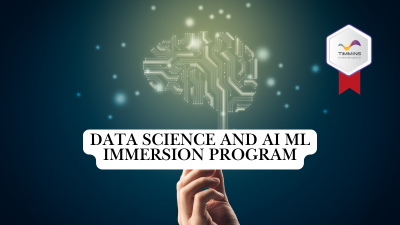
Artificial Intelligence, Machine Learning, Deep Learning
Data Science and AI ML Immersion Program
HRDC Reg. No: 10001462528
Duration: 14 hours (2 days)
Course Overview
This program provides a comprehensive introduction to Data Science and Machine Learning with a focus on practical business applications. Participants will understand data extraction, model selection, fine-tuning, and validation, and explore both supervised and unsupervised learning techniques. The course also demystifies the difference between generative and non-generative AI systems through real-world use cases and hands-on exercises.
Who Should Attend
-
Business leaders and project managers exploring AI-driven business optimization
-
Data scientists and analysts seeking structured AI/ML foundations
-
Software developers integrating AI and ML systems
-
Researchers and professionals in Data Science and R&D
-
Individuals keen to understand and apply AI and ML for business transformation
Why Choose This Course
HRDC Claimable (ID: 10001462528)
Delivered by expert practitioners, this program connects theory with actionable insights for industries including:
-
Technology & Software Development
-
Data Science and Analytics
-
Business Management
-
Research and Development
Participants leave with practical skills to implement AI and ML solutions in real-world scenarios.
Learning Outcomes
Participants will be able to:
-
Understand core Data Science principles and applications
-
Differentiate and apply supervised vs unsupervised learning techniques
-
Explore business use cases of generative and non-generative AI
-
Apply hands-on AI and ML solutions to real-world datasets
-
Integrate AI and ML systems for business optimization
Prerequisites
-
Ongoing or completed Bachelor’s degree with exposure to Spatial Data Types
-
Basic statistical knowledge (helpful but not mandatory)
-
Prior experience with any data analytics tool (advantageous)
-
Strong enthusiasm and active participation
Lab Setup
-
Access to Python and R environments for ML
-
Sample datasets for supervised and unsupervised learning
-
Business case studies for hands-on application
Teaching Methodology
-
Interactive Lectures & Presentations
-
Hands-On Demonstrations & Practical Exercises
-
Real-World Case Studies & Use Cases
-
Quizzes and Wrap-Up Discussions for Reinforcement
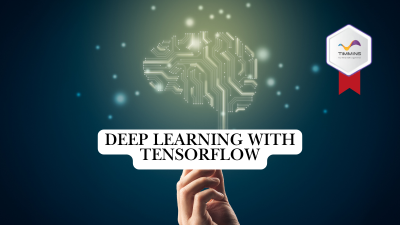
Artificial Intelligence, Machine Learning, Deep Learning
Deep Learning with TensorFlow
HRDC Reg. No: 10001465051
Duration: 35 hours (5 days)
Course Overview
This comprehensive course provides a deep dive into deep learning concepts and their practical implementation using TensorFlow. Participants will build, train, and deploy neural networks, including Convolutional Neural Networks (CNNs) and Recurrent Neural Networks (RNNs). The course combines theoretical foundations with hands-on labs to enable participants to solve real-world problems using deep learning techniques.
Who Should Attend
-
Target Audience:
- Data scientists
- Machine learning engineers
- Software developers
- Researchers in AI/ML
- Professionals upskilling in TensorFlow and deep learning
-
Target Industries:
Information technology, healthcare, finance, automotive, retail, and any industry leveraging AI and machine learning
Learning Outcomes
By completing this course, participants will:
- Understand deep learning fundamentals and neural network architecture.
- Build and train various neural network models using TensorFlow.
- Apply deep learning to tasks such as classification, regression, image processing, and NLP.
- Optimize model performance using regularization, dropout, and advanced optimizers.
- Deploy models in production environments using TensorFlow Serving.
Prerequisites
- Basic knowledge of Python programming
- Familiarity with linear algebra, calculus, and basic statistics
- Experience with machine learning concepts (recommended)
Lab Setup
- Software: TensorFlow, Python (Jupyter Notebook or PyCharm), Anaconda
- Hardware: Minimum 8GB RAM, GPU-enabled systems (preferred)
- Tools: Docker for containerized environments (optional)
Teaching Methodology
- Lectures: Theoretical insights through interactive presentations
- Hands-On Labs: Practical coding sessions in TensorFlow
- Case Studies: Real-world examples for applied learning
- Group Activities: Collaborative projects for problem-solving
- Q&A Sessions: Reinforcement of concepts through discussions
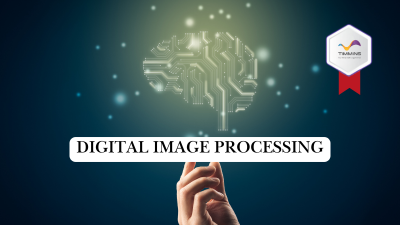
Artificial Intelligence, Machine Learning, Deep Learning
Digital Image Processing
HRDC Reg. No: 10001463721
Duration: 21 hours (3 days)
Course Overview
This course offers a comprehensive introduction to digital image processing, focusing on essential concepts, techniques, and applications. Participants will explore image enhancement, filtering, segmentation, feature extraction, and advanced algorithms for transformation and compression. Hands-on exercises and real-world examples will prepare participants for applications in fields such as medical imaging, video processing, and computer vision.
Who Should Attend
-
Target Audience:
- Software engineers and developers
- Students and professionals in computer science and electronics
- Researchers in digital image processing
- Data scientists and analysts working with image data
-
Target Industries:
Information technology, healthcare and medical imaging, robotics and automation, surveillance and security, media and entertainment
Learning Outcomes
By completing this course, participants will:
- Understand the fundamentals of digital image processing.
- Enhance image quality through brightness, contrast adjustments, and histogram equalization.
- Apply filtering techniques for noise reduction and edge detection.
- Implement image segmentation for object identification and analysis.
- Utilize advanced methods for image transformation and compression.
- Develop image processing applications using Python or MATLAB.
Prerequisites
- Basic knowledge of programming (Python or MATLAB preferred)
- Familiarity with linear algebra and calculus
- Understanding of signals and systems (recommended)
Lab Setup
- Computers with Python or MATLAB installed
- Access to image processing libraries (OpenCV, PIL, MATLAB Image Processing Toolbox)
- Sample image datasets for exercises
Teaching Methodology
- Lectures: Explaining theoretical concepts with real-world examples
- Hands-On Labs: Practical coding sessions and exercises
- Case Studies: Industry-specific applications of image processing
- Quizzes and Assessments: To evaluate learning progress
- Group Discussions: Collaborative problem-solving activities
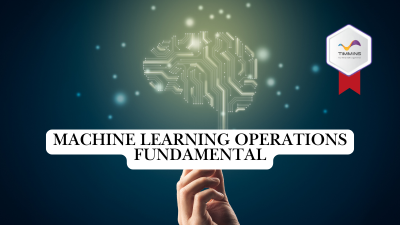
Artificial Intelligence, Machine Learning, Deep Learning
Machine Learning Operations Fundamental
HRDC Reg. No: 10001411721
Duration: 35 hours (5 days)
Course Overview
This course provides foundational knowledge of MLOps, focusing on deploying, operating, and managing machine learning models in production environments. Participants will learn core technologies, workflows, and best practices, including CI/CD pipelines, Kubernetes, AI platforms, and cloud infrastructure, to ensure reliable and scalable ML operations.
Who Should Attend
-
Target Audience:
- Data scientists
- Data engineers and analysts
- ML engineers
- DevOps engineers
- MLOps enthusiasts and professionals
- Machine learning professionals interested in production deployment
-
Target Industries:
IT, data analytics, artificial intelligence, and cloud computing
Learning Outcomes
By completing this course, participants will:
- Understand and apply core technologies for MLOps.
- Configure cloud-based architectures (AWS, Azure, GCP) for ML environments.
- Implement reproducible training and inference workflows.
- Integrate CI/CD practices for ML systems.
- Manage and monitor deployed ML models effectively.
Prerequisites
- Completion of "Machine Learning with Google Cloud" or equivalent experience
Teaching Methodology
- Instructor-led sessions
- Hands-on exercises and projects
- Practical implementation of real-world scenarios

Artificial Intelligence, Machine Learning, Deep Learning
Machine Learning
HRDC Reg. No: 10001513561
Duration: 14 Hours (2 Days)
Course Overview
This intensive hands-on course covers machine learning fundamentals, including supervised and unsupervised learning, neural networks, deep learning, and model optimization. Participants will use Python libraries (NumPy, Pandas, Scikit-learn, TensorFlow, Keras) to build and evaluate real-world ML models.
Who Should Attend?
- Data analysts, software engineers, and developers transitioning into ML.
- Professionals working in data-driven industries.
- Students and enthusiasts looking to start their ML journey.
Why Choose This Course?
- HRDC Claimable (HRDC Registration No: 10001513561).
- Covers machine learning workflow, model training, and evaluation.
- Hands-on Python programming with real-world datasets.
- Learn supervised, unsupervised, and deep learning techniques.
Learning Outcomes
By the end of this course, participants will be able to:
Understand key machine learning concepts (supervised, unsupervised, reinforcement).
Use Python libraries (NumPy, Pandas, Scikit-learn, TensorFlow, Keras).
Implement Regression, Classification, Clustering, and Deep Learning models.
Optimize ML models using hyperparameter tuning & cross-validation.
Solve real-world machine learning problems.
Prerequisites
- Basic Python programming knowledge.
- Familiarity with statistics & linear algebra concepts.
System Requirements
Software:
- Anaconda Distribution (Python 3.x, Jupyter Notebook, IDEs like VS Code/PyCharm)
- Installed libraries: NumPy, Pandas, Matplotlib, Seaborn, Scikit-learn, TensorFlow, Keras
Hardware:
- 16GB RAM, Intel i7 processor (or equivalent)
Teaching Methodology
Instructor-led Training – Hands-on coding in Python ML libraries.
Live Demonstrations – Practical implementation of ML models.
Group Discussions & Case Studies – Real-world ML applications.
Assessments & Hands-on Labs – Build & optimize ML models.

Artificial Intelligence, Machine Learning, Deep Learning
Graph Neural Networks Using Phyton
HRDC Reg. No: 10001511740
Duration: 14 Hours (2 Days)
Course Overview
This course provides a comprehensive introduction to Graph Neural Networks (GNNs), covering graph theory, deep learning concepts, and real-world GNN applications. Participants will learn how to implement GNN models using Python libraries such as PyTorch Geometric, DGL, and NetworkX.
Who Should Attend?
- Data Scientists & Machine Learning Engineers
- AI Researchers & Software Developers
- Professionals working with Graph-Structured Data
Why Choose This Course?
- HRDC Claimable (HRDC Registration No: 10001511740).
- Hands-on training with GNN models, PyTorch Geometric, and DGL.
- Covers node classification, graph classification, and link prediction.
- Learn graph embedding, message passing, and graph attention networks (GATs).
Learning Outcomes
By the end of this course, participants will be able to:
Understand theoretical foundations of GNNs and graph data.
Implement GNN models in Python using PyTorch Geometric & DGL.
Apply GNNs to real-world problems (node classification, link prediction).
Optimize and scale GNN models for large graphs.
Deploy GNN-based AI solutions in production environments.
Prerequisites
- Basic Python programming knowledge.
- Familiarity with machine learning & deep learning frameworks (PyTorch or TensorFlow).
Lab Setup
System Requirements:
- Windows 11 / Linux
- Jupyter Notebook, PyTorch, PyTorch Geometric, DGL, NetworkX
Teaching Methodology
Instructor-led Training – Hands-on GNN coding in Python.
Live Demonstrations – Step-by-step graph model development.
Practical Labs & Exercises – Implementing real-world graph learning tasks.
Q&A & Case Studies – Discuss GNN advancements & scalability challenges

Artificial Intelligence, Machine Learning, Deep Learning
Deep Learning
HRDC Reg. No: 10001513555
Duration: 14 Hours (2 Days)
Course Overview
This intensive 2-day course provides a hands-on introduction to deep learning, covering neural networks, CNNs, RNNs, transfer learning, and GANs. Participants will build and deploy deep learning models using TensorFlow/Keras for real-world applications in computer vision, NLP, and AI model deployment.
Who Should Attend?
- Data Scientists, AI Enthusiasts & Software Developers
- IT Professionals transitioning into Deep Learning & AI roles
- Professionals in Technology, Healthcare, Finance, E-commerce, and Manufacturing
Why Choose This Course?
- HRDC Claimable (HRDC Registration No: 10001513555).
- Covers deep learning fundamentals, CNNs, RNNs, and Generative AI.
- Hands-on training with TensorFlow/Keras & real-world datasets.
- Learn model deployment using Flask and TensorFlow Serving.
Learning Outcomes
By the end of this course, participants will be able to:
Understand deep learning concepts and AI applications.
Build, train, and evaluate neural networks with TensorFlow/Keras.
Implement CNNs for image processing and RNNs for sequential data.
Apply transfer learning with pre-trained models.
Develop Generative Adversarial Networks (GANs) for image generation.
Deploy deep learning models using Flask and TensorFlow Serving.
Prerequisites
- Basic Python programming knowledge.
- Familiarity with machine learning concepts and linear algebra.
Lab Setup
System Requirements:
- Windows 10/macOS/Linux
- 16GB RAM, Intel i7 processor (or equivalent)
- Python 3.8+, TensorFlow/Keras, Jupyter Notebook
Installation Command:
Teaching Methodology
Instructor-led Training – Hands-on TensorFlow/Keras coding.
Live Demonstrations – Step-by-step AI model implementation.
Practical Labs & Exercises – Real-world deep learning projects.
Q&A & Group Activities – Collaborative problem-solving.

Artificial Intelligence, Machine Learning, Deep Learning
Generative AI and Large Languange Model
HRDC Reg. No: 10001513558
Duration: 14 Hours (2 Days)
Course Overview
This hands-on course provides an in-depth exploration of Generative AI and Large Language Models (LLMs). Participants will learn about transformer-based architectures (GPT, BERT, T5), text generation, summarization, translation, fine-tuning, and chatbot development using Hugging Face, PyTorch, and TensorFlow.
Who Should Attend?
- Data Scientists & AI Engineers
- Software Developers & AI Enthusiasts
- IT Professionals interested in Generative AI
Why Choose This Course?
- HRDC Claimable (HRDC Registration No: 10001513558).
- Covers transformers, LLMs, and text generation with GPT & BERT.
- Hands-on training with Hugging Face, PyTorch, and TensorFlow.
- Learn fine-tuning techniques and chatbot development.
Learning Outcomes
By the end of this course, participants will be able to:
Understand Generative AI principles and Large Language Models (LLMs).
Implement transformer-based models like GPT, BERT, and T5.
Use pre-trained LLMs for text generation, summarization, and translation.
Fine-tune LLMs for domain-specific applications.
Develop chatbots and conversational AI solutions.
Prerequisites
- Basic Python programming knowledge.
- Familiarity with machine learning concepts (PyTorch or TensorFlow is a plus).
Lab Setup
Software:
- Python (3.8+), Hugging Face Transformers
- PyTorch or TensorFlow
- Jupyter Notebook / VS Code
- Flask or FastAPI (for chatbot deployment)
Hardware:
- Intel i7 or equivalent
- 16GB RAM
Teaching Methodology
Instructor-led Training – Hands-on coding with LLMs & Generative AI.
Live Demonstrations – Step-by-step text generation & fine-tuning.
Practical Labs & Exercises – Implementing Hugging Face models.
Group Discussions & Case Studies – Addressing ethical challenges in AI.
